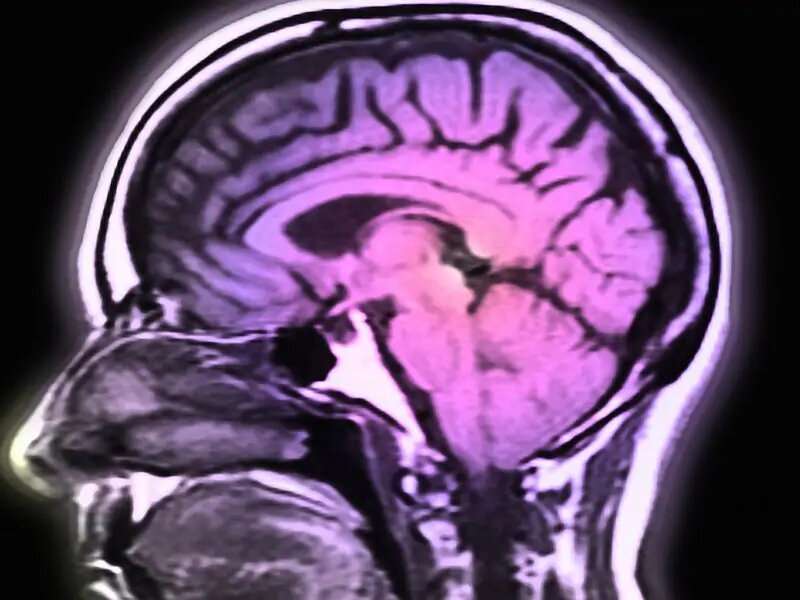In some cases, COVID-19 may harm the brain: study

(HealthDay)—The woman worked in the airlines industry and was in her late 50s. She arrived at Henry Ford Health System in Detroit with a cough, fever and mental confusion that had arisen over the prior three days.
A nasal swab test showed she was infected with the new coronavirus. And as doctors tried to track down the cause of her "altered mental status," brain scans revealed an encephalopathy— swelling in some areas of the brain—as well as small areas of brain cell death.
It's a condition that's relatively rare in adults and potentially deadly, according to a team led by Henry Ford radiologist Dr. Brent Griffith.
"While [COVID-19] patients typically present with fever, shortness of breath and cough, neurologic manifestations have been reported, although to a much lesser extent," the woman's doctors wrote in the April 2 issue of the journal Radiology.
Their diagnosis: "COVID-19-associated acute necrotizing hemorrhagic encephalopathy, a rare encephalopathy that has been associated with other viral infections."
It's believed the brain can be damaged by viral infection whenever a patient's immune system overreacts to the virus. This immune system hyperactivity triggers a "cytokine storm"—an overproduction of immune cells and their activating compounds, known as cytokines.
In the Detroit woman's case, it's thought that an "intracranial" cytokine storm occurred. That led to a breakdown of the blood-brain barrier that would normally shield the brain.
In an interview with the New York Times, Henry Ford neurologist Dr. Elissa Fory said the quick progression of the woman's illness "may indicate the virus can invade the brain directly in rare circumstances." She added that the woman remains in critical condition at the hospital.
Dr. Anthony Geraci directs neuromuscular medicine at Northwell Health in Great Neck, N.Y. Reading over the woman's case, he said the cytosine storm theory appears to be correct.
"Cytokines are chemicals that, among other functions, can cause small blood vessels to leak, and this can lead to small hemorrhages in many organs including the brain—this is well-known to occur as a consequence of several viral infections, including influenza," Geraci said.
Unfortunately, "there is no specific treatment currently," he added, "and most experts agree that drugs to suppress the immune response could cause more harm than good, so supportive care for these patients is currently the only known treatment."
The Detroit woman's case isn't unique—a sizable minority of COVID-19 patients are presenting at hospitals with confusion, seizures and other signs of brain impairment, researchers report.
For example, in early March a 74-year-old man in Boca Raton was brought to a hospital emergency room by family members. He was unable to speak and his arms and legs were flailing about in what appeared to be a seizure. The man, who also had Parkinson's disease and chronic lung disease, later tested positive for COVID-19.
A report on the case was published online March 21 by neurologist Dr. Asia Filatov of Florida Atlantic University in Boca Raton.
According to the Times, numerous other cases of COVID-19 patients displaying neurologic symptoms—seizures, confusion and signs of encephalitis—have been reported in Italy and elsewhere.
In fact, Dr. Alessandro Padovani, from the University of Brescia in Italy, has opened a special NeuroCovid unit to care for these types of patients, the Times reported.
Dr. Sherry H-Y. Chou is a neurologist at the University of Pittsburgh School of Medicine. She's also leading a research team that's looking into the neurological effects of COVID-19.
"We absolutely need to have an information-finding mission, otherwise we're flying blind," Chou told the Times. "There's no ventilator for the brain. If the lungs are broken, we can put the patient on a ventilator and hope for recovery. We don't have that luxury with the brain."
But Dr. Robert Stevens, a neurologist at Johns Hopkins School of Medicine in Baltimore, stressed that neurological complications remain rare for patients infected with the new coronavirus.
"Most people are showing up awake and alert, and neurologically appear to be normal," he told the Times. As to why the brain can sometimes be affected, he said that "we are still in the early days of this, and we don't really know for sure."
He said it could be something as simple as impaired respiratory function lowering the flow of oxygen to the brain. That "can have significant impact on the function of the brain, and lead to states of confusion and lethargy," Stevens said.
Neurological symptoms appear to be more common as COVID-19 becomes more severe, experts noted. In fact, the U.S. Centers for Disease Control and Prevention currently lists "new confusion or inability to rouse" as a warning sign that any ill person should seek immediate medical care.
More information: The U.S. Centers for Disease Control and Prevention has more on the new coronavirus.
Copyright © 2020 HealthDay. All rights reserved.




















